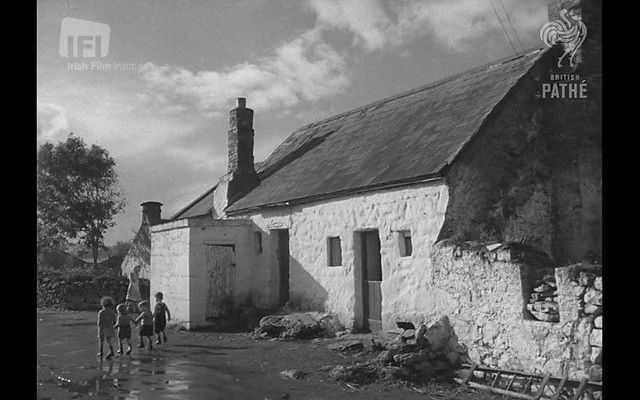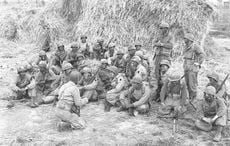The 1949 short film “Ennis,” from British Pathé, is featured on the Irish Film Institute’s IFI Player.
While Pathé’s lens focuses on primitive thatched cottages in this short film, the narrator describes how Ennis "clings to the old ways of life."
A young boy fills a bucket from a street pump, and the voiceover tells how "water for a wash or a drink still means a long walk for someone."
Shannon Airport is only sixteen miles away and the locals have noticed a change. Cars, once a rare sight in the village, now ‘disturb the peace and quiet’ and hold up traffic on narrow country lanes. 23-year-old hotelier Josette O’Regan, however, anticipated the rise of footfall and marketed The Old Ground Hotel to tourists and airlines.
This film is part of The Irish Independence Film Collection – The Early Irish Free State which explores facets of Irish society after the War of Independence and up to the birth of the Irish Republic.
About the IFI’s Early Irish Free State Collection
The Easter Rising, the War of Independence, and the Irish Civil War formed one of the most turbulent political periods in Ireland’s history. The impact of this struggle would define the social and political landscape of the emerging Irish Free State.
The Early Irish Free State Collection leads on from the IFI's previous historical release The Irish Independence Collection and explores aspects of the nation. Film production in Ireland was of low political and economic priority during this period and the newsreels, documentaries, and cinémagazines in this collection were filmed by the non-indigenous agency, British Pathé.
Although this representation of Ireland through a foreign lens offers us a very specific view of the fledgling nation, it also documents aspects of Irish life that may otherwise not have been recorded. We see parts of the country struggling with potato blight, traditional craft-making, and the isolated way of life of the western islanders, in stark contrast to modern developments such as the development of hydro-power, manufacturing fairs, the promotion of brand Ireland and finally the beginning of the Irish Border, a concern which would return in this century.
These Irish newsreel stories were not held in an Irish archive until very recently and many had not been made available to the public since their distribution nearly 100 years ago. With the support of the Department of Culture, Heritage, and the Gaeltacht, the Irish Film Institute was able to work with the original custodians of these collections (the British Film Institute and British Pathé) in order to repatriate, safeguard and share these vital visual records. By digitizing the fragile, original nitrate film prints to high-definition format, historians, academics, and the public can now witness details not evident in the standard definition versions of the material, previously available.
The Early Irish Free State Collection enlists the expertise of Brenda Malone, of the National Museum of Ireland (NMI), to examine and add context to depicted events, people, and locations, many of which were originally missed by non-Irish cataloguers. Additionally, Brenda links artifacts held at NMI, that carve out a broader, contextual historical map of politics, folklife, religion, and tourism in the Irish Free State. Through this multiplicity of perspectives, we are able to see a nation forging its identity whilst grappling with the legacy of its tumultuous history.
"Ennis" is published with thanks to the Irish Film Institute (IFI). You can find all IrishCentral articles and videos from the IFI here.
To watch more historic Irish footage, visit the IFI Player, the Irish Film Institute’s virtual viewing room that provides audiences around the globe free, instant access to Irish heritage preserved in the IFI Irish Film Archive. Irish Culture from the last century is reflected through documentaries, animation, adverts, amateur footage, feature films, and much more. You can also download the IFI Player Apps for free on iPhone, Android, Apple TV, Amazon Fire TV, and Roku.



